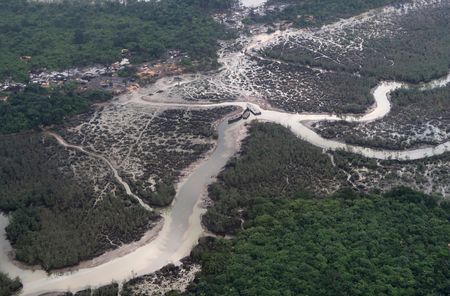 1
1 1
1

By Camillus Eboh
ABUJA (Reuters) – A Nigerian court has stopped Shell Plc from selling any assets in Nigeria until a decision is reached on the company’s appeal of a nearly $2 billion penalty for an alleged oil spill.
A copy of the court ruling, which was seen by Reuters on Monday, was issued on March 11 and also ordered Shell to deposit the money in an account controlled by the court within two working days.
A spokesperson for Shell’s Nigeria unit said the company would immediately appeal the decision.
A panel of three judges said Shell, acting through its agents or subsidiaries was restrained from “selling, allocating, vandalising or disposing off any of its assets/properties …” pending the determination of the appeal.
Shell’s appeal hearing is set to begin on May 5.
“We are disappointed at this outcome. We have a strong belief in the merit of our case and will take immediate steps under the law to appeal and stay the execution of the decision until the appeal is determined,” the spokesperson said.
A Federal High Court in November 2020 ordered Shell to pay 800 billion naira ($1.95 billon) to 88 communities of Egbalor Ebubu in Rivers state, who had accused the company of an oil spill that damaged their farms and waterways.
Shell, which denied causing the spill, then appealed the verdict.
Shell started talks with the Nigerian government last year about selling its stake in the West African country’s onshore fields, where it has been active since the 1930s, as part of a global drive to reduce its carbon emissions.
The company, the most significant international oil major operating in Nigeria, has faced a string of court cases in the past over oil spills.
Last year, Shell agreed to pay a Nigerian community $111.68 million to settle a case over an oil spill that took place more than 50 years ago.
(Additional reporting by Tife Owolabi in Yenagoa, Editing by MacDonald Dzirutwe, Jane Merriman and Emelia Sithole-Matarise)